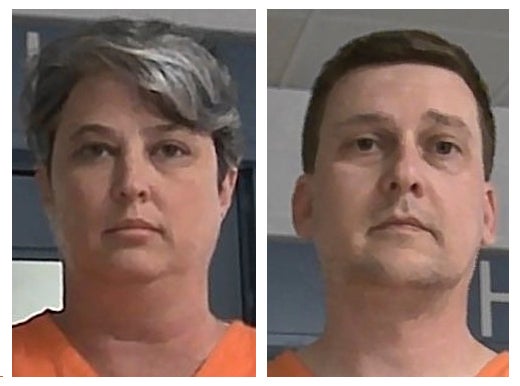Maryland couple plead guilty in submarine secrets sale case
A U.S. Navy nuclear engineer and his wife have entered new guilty pleas in a case in West Virginia involving the sale of secrets about nuclear submarines

Your support helps us to tell the story
From reproductive rights to climate change to Big Tech, The Independent is on the ground when the story is developing. Whether it's investigating the financials of Elon Musk's pro-Trump PAC or producing our latest documentary, 'The A Word', which shines a light on the American women fighting for reproductive rights, we know how important it is to parse out the facts from the messaging.
At such a critical moment in US history, we need reporters on the ground. Your donation allows us to keep sending journalists to speak to both sides of the story.
The Independent is trusted by Americans across the entire political spectrum. And unlike many other quality news outlets, we choose not to lock Americans out of our reporting and analysis with paywalls. We believe quality journalism should be available to everyone, paid for by those who can afford it.
Your support makes all the difference.A U.S. Navy nuclear engineer and his wife entered new guilty pleas Tuesday in a case involving an alleged plot to sell secrets about nuclear-powered warships, a month after their previous plea agreements that had called for specific sentencing guidelines were rejected.
Jonathan and Diana Toebbe of Annapolis, Maryland, pleaded guilty in federal court in Martinsburg, West Virginia, to one felony count each of conspiracy to communicate restricted data.
U.S. District Judge Gina Groh last month rejected the couple's initial pleas to the same charges, saying the sentencing options were “strikingly deficient” considering the seriousness of the case. The couple then immediately withdrew their initial guilty pleas and Groh set trial for January.
The previous sentencing range agreed to by lawyers for Jonathan Toebbe had called for a potential punishment between roughly 12 years and 17 years in prison. Prosecutors said Tuesday that such a sentence would be one of the most significant imposed in modern times under the Atomic Energy Act of 1954. Prosecutors also sought three years for Diana Toebbe.
Under the latest plea agreement entered Tuesday before U.S. Magistrate Judge Robert Trumble, the couple would each face a maximum sentence of life in prison and a $100,000 fine, although prosecutors are asking for a sentence for Diana Toebbe at the lowest end of the guideline range.
If the court doesn't accept the latest agreement, the defendants would again have the right to withdraw their guilty pleas.
Prosecutors said Jonathan Toebbe, 43, abused his access to top-secret government information and repeatedly sold details about the design elements and performance characteristics of Virginia-class submarines to someone he believed was a representative of a foreign government but who was actually an undercover FBI agent.
Diana Toebbe, 46, who was teaching at a private school in Maryland at the time of the couple's arrest last October, was accused of acting as a lookout at several prearranged “dead-drop” locations at which memory cards containing the secret information were left behind.
The memory cards were devices concealed in objects such as a chewing gum wrapper and a peanut butter sandwich. The couple was arrested after he placed a memory card at a dead drop location in Jefferson County, West Virginia.
None of the information was classified as top secret or secret, falling into a third category considered confidential, according to previous testimony.
The FBI has said the scheme began in April 2020, when Jonathan Toebbe sent a package of Navy documents to a foreign government and wrote that he was interested in selling to that country operations manuals, performance reports and other sensitive information. He included in the package, which had a Pittsburgh return address, instructions to his supposed contact for how to establish a covert relationship with him, prosecutors said.
That package was obtained by the FBI in December 2020 through its legal attaché office in the unspecified foreign country. That set off a monthslong undercover operation in which an agent posing as a representative of a foreign country made contact with Toebbe, ultimately paying $100,000 in cryptocurrency in exchange for the information Toebbe was offering.
The country to which he was looking to sell the information has not been identified in court documents and was not disclosed in court.
Prosecutors said the government has recovered classified information that Jonathan Toebbe had saved on electronic devices along with a “substantial amount” of the cryptocurrency.
During a search of the couple's home, FBI agents found a trash bag of shredded documents, thousands of dollars in cash, valid children’s passports and a “go-bag” containing a USB flash drive and latex gloves, according to court testimony last year.
Diana Toebbe’s lawyers at a December 2021 hearing denied prosecution assertions that cited 2019 messages exchanged by the couple in which she had contemplated fleeing the United States to avoid arrest. Instead, the defense said it was contempt for then-President Donald Trump as the reason behind the couple’s emigration plans.